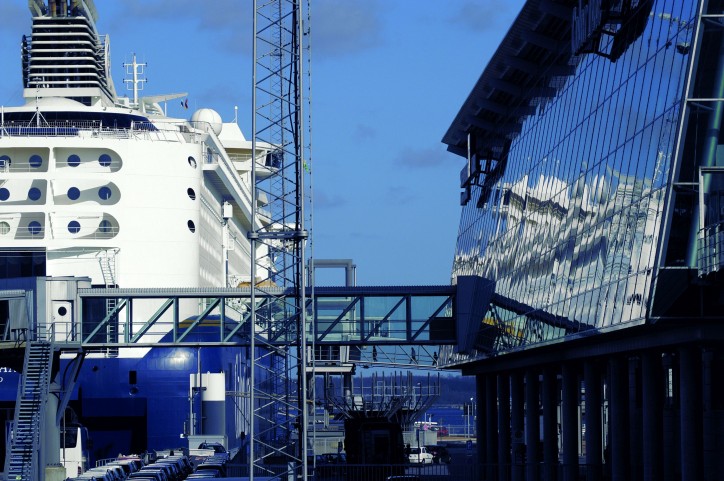The PORT OF KIEL’s first shore-based power supply plant for shipping was officially inaugurated at the Norwegenkai on May 9th. The facility was declared open jointly by the Minister-President of the federal state of Schleswig-Holstein, Daniel Günther, the German Federal Government’s Coordinator for the Maritime Industry, Norbert Brackmann, and the Lord Mayor of Kiel Dr Ulf Kämpfer along with Dr Dirk Claus, the Managing Director of the PORT OF KIEL (SEEHAFEN KIEL GmbH & Co. KG) and Trond Kleivdal, Board Chairman of the Color Line. With immediate effect, the Color Line’s big cruise-ferries can now be supplied with emission-free electric power from on shore.

Minister-President Günther said: “We are together making an important contribution to keeping the air clean. By using power from on shore we are reducing to zero the emission of harmful substances as well as of greenhouse gases during the time ships are berthed in the port. Schleswig-Holstein supports this trend-setting project and will encourage further facilities of this type”, he added. Schwedenkai Terminal and the cruise shipping terminal at Ostseekai will follow the Norwegenkai example and are to get shore-based power supply capability for ships in the coming year.
Dirk Claus commented: “In future we want to be in a position to use shore-based electricity to cover 60% of the power requirements of ships calling at Kiel. That will mean we will be able to count ourselves among the most eco-friendly ports in Europe.”
The building contractor for the shore-based power plant, which was built by Siemens, is the PORT OF KIEL. Investment in the plant totalled €1.2 million, of which €400,000 was funded by the state of Schleswig-Holstein.
Kiel Lord Mayor Ulf Kämpfer said: “As a city which protects climate, Kiel would like to become carbon neutral by 2050. We can only achieve this ambitious goal if everyone helps. The new ultra-modern shore-based power plant is making a contribution to significantly reducing CO2 emissions in the port. I am delighted that Color Line is leading this effort and I would welcome it if other shipping companies were to follow suit.”
The ships of Norway’s Color Line – Color Fantasy and Color Magic - link Kiel with Oslo on a daily basis. They arrive at the Norwegenkai in the morning at 10 a.m. and leave again at 2 p.m.. Their annual power requirement for the time they spend in Kiel is about four million kilowatt hours.
Color Line Board Chairman Trond Kleivdal said: “Our ships are already equipped to draw power from land-based plants and have been plugged in on- shore in Oslo since 2011 and in all four Norwegian ports since 2017. Kiel is now another port which has made available the necessary infrastructure to support and advance our strategy of protecting the environment. Now it is up to the German Federal Government, to reduce the renewable energy levies on land power due under the Renewable Energy Sources Act (EEG) in order to create an improved economic framework.”
Commenting on this issue at the inauguration of Kiel’s shore-based power plant for shipping, Norbert Brackmann said: “Land power is a good way to make a clear contribution to clean air in cities which have harbours and sea ports. So it is certainly a good idea to have a shore-based power plant and it is even better when this plant is also used by shipping. We will, therefore, clear the way at government level to make land power more competitive and as Government Coordinator, for the Maritime Industry I will campaign for this.”
The Siemens on-shore power plant at the Norwegenkai is specifically tailored to the needs of shipping companies and the port. It has a maximum connection capacity of 4.5 Magawatts (MW) at 10 Kilovolt (KV) and a mains frequency of 50 Hertz (Hz).
Dirk Claus said: “Because of its considerable capacity and regular daily operation, a high level of environmental utilisation will be achieved. The new plant will deliver the largest amount of shore-based electric power (for ships) in the whole of Germany.”
Hub of the plant is an air-insulated, metal-enclosed, medium voltage switch unit. The PLUG shore to ship transfer station is from French manufacturer NG3 and is equipped with a programmed logic control unit (PLC) which communicates with the land station’s switching gear. All the necessary switching commands passed on by the ship via the system’s interface are carried out automatically. Before power is transferred from shore to ship, however, the system first checks for correct plug and cable connections. Once this has taken place, the connection to shore is switched on and the ship synchronises itself with the shore plant, which then handles supply.
Source: Port of Kiel (Additional information about the Port of Kiel at CruiseMapper)